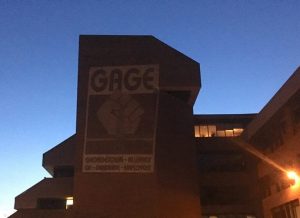Frustrated with the university’s treatment of its workers during the COVID-19 pandemic, a group of undergraduate students, graduate workers, and staff have come together to form the Georgetown Coalition for Workers’ Rights. The coalition released a statement titled “Georgetown Is Failing Its Workers” on Feb. 23, demanding that the university suspend the Redeploy Georgetown program, ensure Aramark workers’ safety, and bring workers into transparent conversations about employment.
The February letter is not the first backlash against Redeploy Georgetown, a $5 million cost-cutting program that reassigns staff to new health and safety roles in the pandemic. In a Jan. 26 open letter to administrators, staff members protested the program arguing the university coerced employees into the public health screening roles with the threat of unpaid leave and suspended health benefits. While Redeploy Georgetown was implemented last spring on a voluntary basis, it was made mandatory for the Spring 2021 semester. Redeployed employees, who are not unionized and also disproportionately women and people of color, are thus left with little choice but to accept their new assignments that may expose them and their families to COVID-19.
When the January demands were not met, students, faculty, and staff across the university collaborated on a more comprehensive letter with over 270 signatures calling for the program’s termination and further protection of Aramark employees. The coalition accuses the university of violating its Just Employment Policy (JEP), which holds the university responsible for providing a “living wage” and a “safe and harassment-free environment” to its workers.
Leo Rassieur (COL ’23), an undergraduate coalition member, explained that while the demands originate from employees, students can use advocacy to build a bridge of communication between employees and the administration, especially as university workers do not want to risk their jobs. “This whole idea for coalition in many ways, came from those workers who found out about our advocacy as students and wanted to show their solidarity,” he said.
Rassieur pointed out that this coalition helps employees from across the Georgetown community, whether graduate students, facilities workers, or Aramark contracted employees, to unite behind a set of demands. “If you work at Leo’s, you’re not having meetings with someone from the MSB right, and that’s intentional. Georgetown prefers it that way, in a sense, so that workers don’t one day wake up and say ‘hmm there’s something going on here that’s not just a me problem it’s an us problem.”
The coalition offers a solution to this very issue. By connecting with each other, the employees hope to defend themselves against what they consider to be untenable conditions. “Georgetown University has a consistent pattern of abusive labor practices against university staff and is nothing new,” a university employee who preferred not to be identified wrote in an email to the Voice. “Staff have very little protections at Georgetown University, and the administration benefits from this arrangement. It is by design.”
The coalition is supported by and includes members of GAGE, Georgetown’s union of graduate employees. According to GAGE President Jewel Tomasula (PhD ’24), GAGE is involved in the coalition to offer solidarity and resources for negotiating with the university over workers’ rights.
Tomasula emphasized the urgency of reversing the Redeploy Georgetown program and addressing the safety of Aramark workers. “Redeployed staff are currently working in on-campus positions they are unfairly pressured to take, which weren’t what they were hired to do, and increase their risk of exposure to the virus,” Tomasula said. “For Aramark workers, the pandemic conditions have made it even more undeniable that they have an incredibly integral and important role in Georgetown University campus operations, and they deserve treatment that reflects this.”
The Redeploy Georgetown program does not impact all employees equally. According to Rassieur, approximately 59 percent of the redeployed employees are people of color, especially Black women.
“It’s obviously not people like President DeGioia being redeployed who are being forced to go stand in front of Healy Hall and check if you have a badge right, it’s not Geoff Chatas who’s doing that, it’s not anyone whose title is Vice President,” Rassieur said. “The higher you go up the totem pole of, you know, the corporate hierarchy just how corporations work, the more you will be seeing men white men with higher income.”
Coalition members are concerned the redeployment program is putting Georgetown’s employees of color disproportionately at risk for contracting COVID-19. Redeployed workers also work under the supervision of the Georgetown University Police Department (GUPD), a working environment the coalition’s letter argues might make workers of color uncomfortable or unsafe.
Ace Frazier (MSB ’23), a student living on-campus, explained their experience testing positive with COVID-19 this spring, during which a Redeploy Georgetown employee transported Frazier to the quarantine rooms in the on-campus hotel. The employee brought Frazier protective gear and attempted to social distance while transitioning to the quarantine housing. “I assumed this was some kind of professional that this is their job and they know that this is their job, this is what they are trained for or are prepared to do at least,” Frazier said. “ I figured out after the fact that none of these people really actively made this decision.”
In an email to the Voice, a university spokesperson claimed that there is a process for Redeploy accommodations in place through the Office of Institutional Diversity, Equity, and Affirmative Action. “In addition, we have listened to and addressed feedback from employees by adjusting Redeploy work schedules,” the spokesperson wrote.
The spokesperson also highlighted the number of health measures put in place to protect on-campus community members, including free COVID-19 testing, installed plexiglass shields, and personal protective equipment for university and Aramark employees.
Despite on-campus guidelines, Frazier observed a lack of compliance with COVID-19 guidelines in Leo J. O’Donovan Hall and expressed concern over employees’ safety. According to Frazier, the increase in on-campus students has crowded the dining hall, especially with some stations shut down. While students are required to wear masks and pick up food to go, Frazier has observed students removing masks or wearing them incorrectly on multiple occasions.
“There are almost 60 or 70 people crammed in the bottom of Leo’s, trying to get food where social distancing just isn’t a possibility anymore, and a lot of them are pulling down their masks to talk to each other, some aren’t social distancing,” Frazier described. “I saw someone pull down their mask to talk to one of the Leo’s workers while telling them their food and got super close to them at the same time. Which is just unacceptable, it’s terrifying, and they’re putting the person at risk.”
Employees that work in the dining hall and other dining locations across campus are employed indirectly by the university through Aramark. While these workers are unionized, they do not enjoy the same benefits as other staff, and during the pandemic, Aramark workers have had their normal hours reduced in half. The Coalition for Workers’ Rights cites this as another university violation of its JEP by failing to pay its workers a “living wage.”
While Aramark workers continue to be paid $17.28 an hour, a “living wage” according to the JEP, the coalition calculated their yearly earnings from their reduced hours and found that in the most ideal conditions, Aramark workers are earning a deficit of at least $1,331.20 from a living wage.
The Georgetown employee pointed out how, for many staff members concerned about rent, health, and immunocompromised family, the Just Employment Policy fails to meet its stated purpose. “Just employment is a toothless policy that the Georgetown University administration loves to pontificate. It is convenient,” they said.
“What does this piece of paper mean for Aramark staff with slashed wages who are falling behind on rent?” the employee added, “What does this piece of paper mean for staff of color and women who are disproportionately impacted in their centers or departments, and who are more likely to have titles and job responsibilities that are lower-paid with irregular work schedules?”
The university spokesperson reaffirmed the university’s commitment to Aramark employees at Georgetown, citing their financial dedication for employee health care coverage through June 2021 and other assistance options provided by Aramark. “Aramark’s Employee Assistance Program provides resources including but not limited to counseling sessions, legal consulting, financial consulting, parenting support, and eldercare support,” the spokesperson wrote.
The coalition, however, accuses Aramark of helping workers look for second and third jobs rather than providing them enough income to survive. In December, two Georgetown students launched a GoFundMe, raising over $17,000 for an Aramark worker who faced housing and food insecurity during the pandemic. Until Aramark adequately supports its workers, the coalition argues that Georgetown has a moral obligation to intervene.
Frazier emphasized the kindness Leo’s workers always display toward students and is personally concerned for their safety. “I have like a sense of family with them, and it makes me want to be more protective, which is why I joined this coalition specifically,” Frazier said. “Because I’m seeing the hardships that they’re going through on a daily basis and getting to hear from them from their own mouths and their own stories on a daily basis.”
The coalition set a deadline for the university’s response for March 1. While the university did send an email to the coalition, the group’s Instagram account states that the response “barely acknowledged the harsh realities outlined in our statement and did not commit to any actions.” The coalition plans to continue media pressure virtually until they consider all demands adequately addressed by the administration.
“I feel really optimistic about what we can accomplish,” Rassieur concluded. “The whole intent of the list of demands is to put pressure on the administration until they themselves want to come to the negotiating table with actual concessions.”







